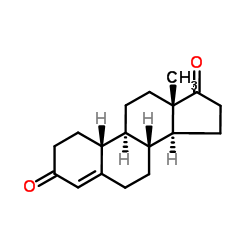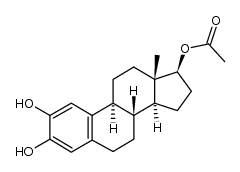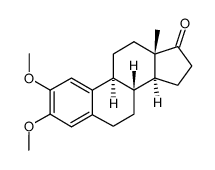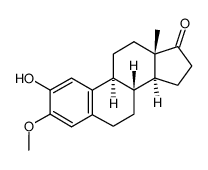362-06-1
| Name | 2-hydroxyestrone |
|---|---|
| Synonyms |
3-Methoxypicolinimidamidehydrochloride
3-O-Methyl 17|A-Estradiol 2-hydroxyestron 2-Hydroxyestrone |
| Description | 2-Hydroxyestrone (Catecholestrone) is a specific receptor-mediated antiestrogenic agent. 2-Hydroxyestrone is anticarcinogenic[1][2]. |
|---|---|
| Related Catalog | |
| Target |
Human Endogenous Metabolite Estrogen receptor |
| In Vitro | 2-Hydroxyestrone exhibits antiestrogen action on MCF-7 human breast cancer cells. Addition of 2-Hydroxyestrone to the cell cultures in concentration of 1-1000 nM has no effect on cell growth and proliferation because of rapid O-methylation of the catechol estrogen by catechol O-methyltransferase which is highly active in these cells. In the presence of quinalizarin, a potent catechol O-methyltransferase inhibitor which reduces the O-methylation of the steroid, 10 and 100 nM 2-Hydroxyestrone markedly suppresses the growth and proliferation of the cells[2]. Cell Proliferation Assay[2] Cell Line: Human breast cancer cell lines MCF-7, MDA-MB-231, and MDA-MB-330 Concentration: 1-1000 nM Incubation Time: 6 days Result: 10 and 100 nM markedly suppressed the growth and proliferation of the cells in the presence of quinalizarin. The tumor cell growth-inhibitory action of the catechol estrogen was neutralized by the presence of 1 nM estradiol. |
| In Vivo | Levels of both 2-Hydroxyestrone (2-OHE1; 2 mg/kg; administered ip.) and 2-Hydroxyestrone 4-N-acetylcysteine thioether (2-OHE1 4SR) in rats treated with 2-Hydroxyestrone were significantly different between the induced and noninduced groups[3]. Animal Model: Female and male Sprague-Dawley rats (6 weeks old)[3] Dosage: 2 mg/kg Administration: Administered i.p. Result: Levels of both 2-OHE1 and 2-OHE1 4SR in rats treated with 2-OHE1 were significantly different between the induced and noninduced groups. |
| References |
[1]. H L Bradlow, et al. 2-Hydroxyestrone: the 'good' estrogen. J Endocrinol. 1996 Sep;150 Suppl:S259-65. |
| Density | 1.241g/cm3 |
|---|---|
| Boiling Point | 481.3ºC at 760 mmHg |
| Melting Point | 199-201ºC |
| Molecular Formula | C18H22O3 |
| Molecular Weight | 286.36500 |
| Flash Point | 259ºC |
| Exact Mass | 286.15700 |
| PSA | 57.53000 |
| LogP | 3.52300 |
| Index of Refraction | 1.609 |
| Storage condition | 2-8°C |
| Hazard Codes | Xi |
|---|
| Precursor 8 | |
|---|---|
| DownStream 3 | |
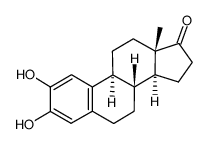
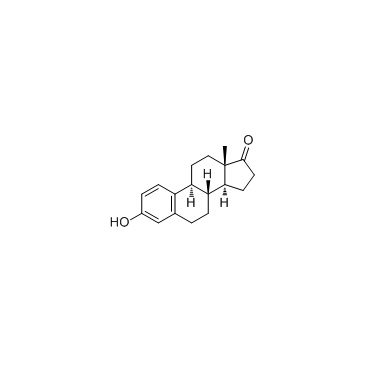
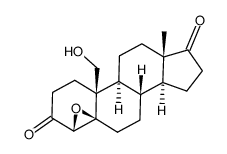
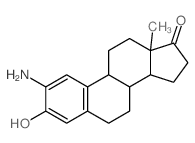
![(8S,9S,13S,14S)-3-hydroxy-13-methyl-2-nitro-7,8,9,11,12,14,15,16-octahydro-6H-cyclopenta[a]phenanthren-17-one structure](https://image.chemsrc.com/caspic/229/5976-73-8.png)
